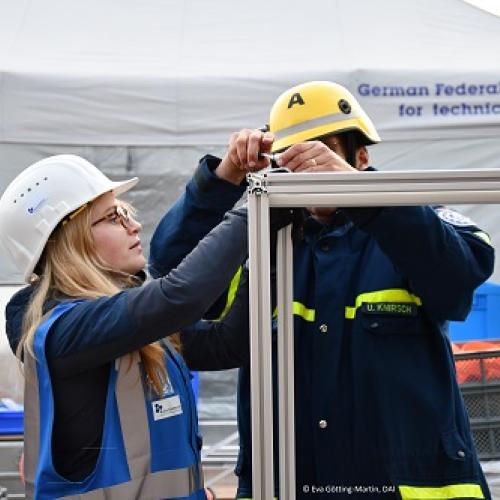Author: Constance Domenech de Cellès, Research Associate, and Eva Götting-Martin, Communications Officer, German Archaeological Institute
In March 2024, the KulturGutRetter project launched its first call for volunteers, to recruit cultural heritage professionals in Germany who are willing to join a pool of experts to provide emergency response to cultural heritage at risk. Under the direction of the Federal Agency for Technical Relief (THW), the Cultural Heritage Response Unit (CHRU) will be deployed to disaster sites at the request of an affected country, immediately after the life-saving phase, to protect damaged or threatened tangible cultural heritage from further destruction.
Nearly 200 specialists in cultural heritage assessment, documentation, conservation, salvage and IT attended one of the two online information sessions organized by the three project partners – the German Archaeological Institute (DAI), the Federal Agency for Technical Relief (THW) and the Leibniz Centre for Archaeology (LEIZA).
Of the volunteers who applied, more than 100 were selected to take part in the training in 2024, together with civil protection experts from the THW. The online training started in May 2024, using the iDAI.tutorials learning platform. The e-learning content developed by the DAI enables professionals from the fields of conservation, architecture, building research, crafts, archaeology and IT to familiarize themselves with the equipment, standards and workflows of the Cultural Heritage Response Unit.
During a hands-on training session at the end of June, the cultural heritage and civil protection volunteers will be trained on topics such as the installation and use of the mobile emergency conservation laboratory, the handling of operational hardware and software, as well as standard procedures. The training will be led by professionals from DAI and LEIZA as well as staff from THW and will be hosted in one of THWs logistics centers, where the CHRU-equipment is located, in order to be able to deploy quickly in future.
This training phase will culminate in September 2024 with a national full-scale exercise involving a fictional disaster scenario where volunteers will be prepared for their first deployment. From next year, more cultural heritage volunteers will be able to apply to strengthen the growing pool of volunteers. Application for volunteers from the civil protection sector can be made throughout the year to the local sections (Ortsverbände) of the THW.
The aim of this training phase is to ensure that the CHRU is operational in 2025. In future the module will be embedded in the European Union Civil Protection Mechanism (UCPM), and therefore could contribute to the protection and preservation of cultural heritage worldwide. The project is supported by the Federal Foreign Office and the German Bundestag.
